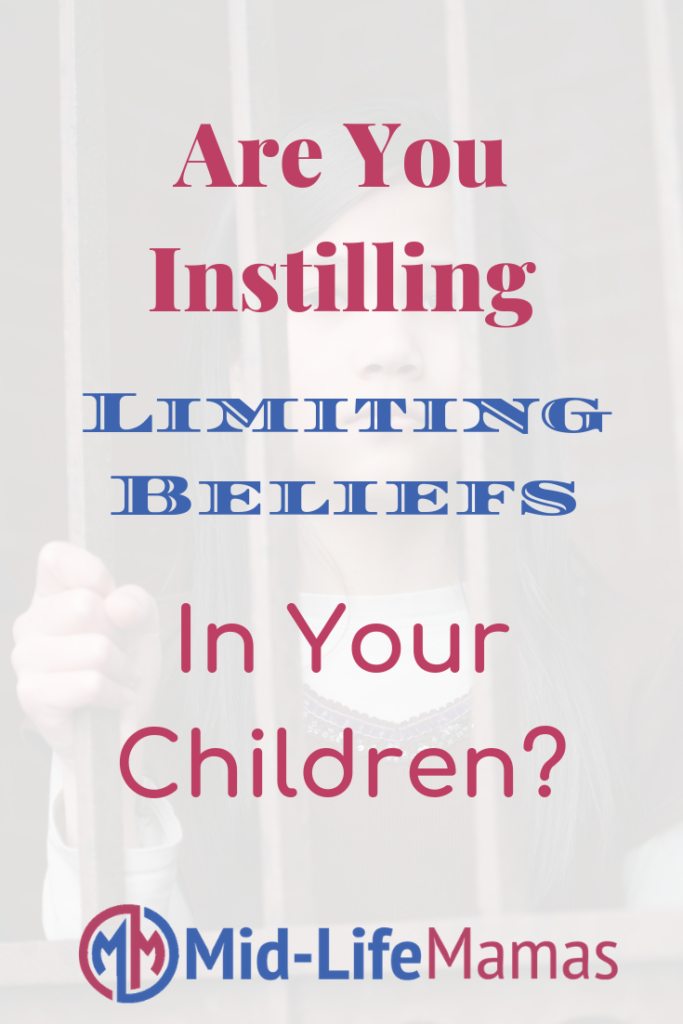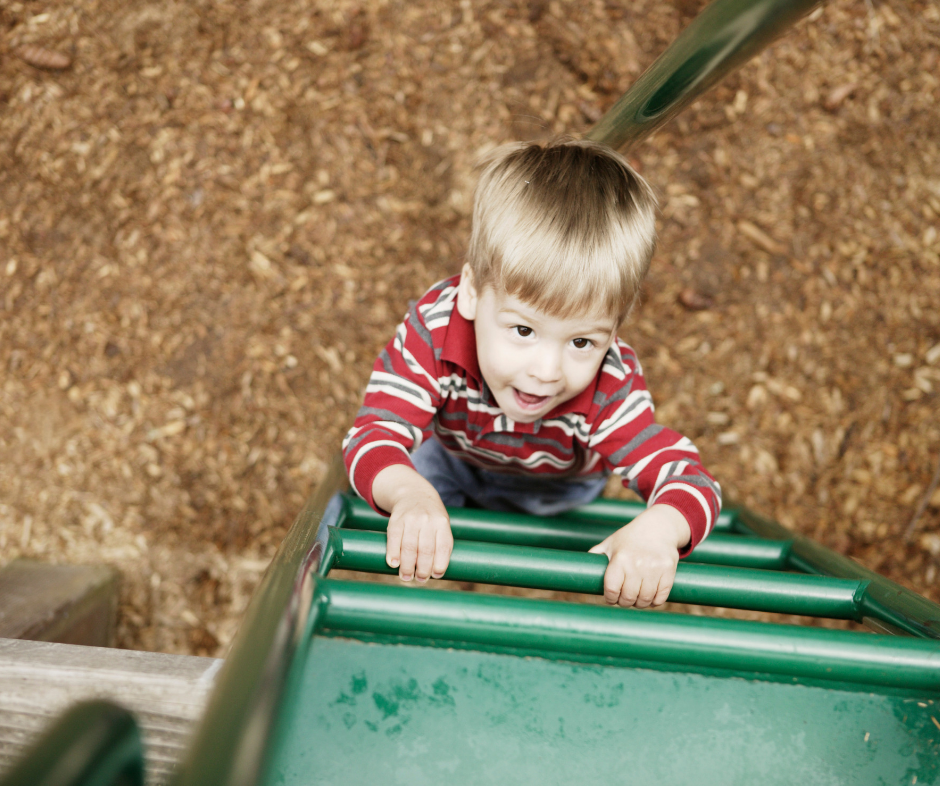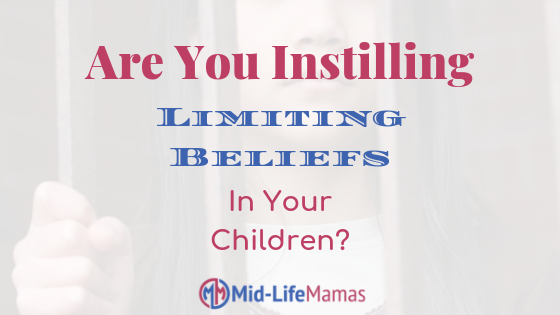
Limiting beliefs we all have them. Whether we know about them consciously or not. Chances are some of them came from our parents when we were kids. Are you instilling limiting beliefs in your children?
Our parents were well meaning when they were trying to protect us from getting hurt, disappointed or even heart broken. But in the process they may have set us up for failure in different areas of our lives.
They were telling us to be careful so we wouldn’t get hurt. But it may have been registering with us that we should play it safe all the time. It told us not to go out of our comfort zone because there may be negative results. Kids are born risk takers and as parents we want to encourage that behavior (within reason) and not squash it.
How about being told you can’t or shouldn’t do something? Again our parents or other caring individuals were trying to help us. But in the process the word can’t was “hammered” into our vocabulary at an early age.
So what can we do as parents to instill positive empowering beliefs instead of limiting beliefs in our children?
5 things We Can Do As Parents To Not Instill Limiting Beliefs In Our Children

It’s so important to be conscious of how you talk to your children. You don’t want to leave imprints of limiting beliefs in the minds of your children.
It’s ironic that we tell our kids they can do or be anything they want, but when they tell us things that we can’t see as a reality we back peddle.
If we tell them they can’t or shouldn’t do things constantly it can lead them into having self doubt about their abilities. This may stop them from being open to great opportunities in the future.
Our unconscious minds have not caught up with our evolutionary changes. The minds highest priority is always to keep us safe. When we tell our kids not to do something because it’s dangerous they may take that with them throughout their life. But it may only have been dangerous for them because they were young.
Just like our parents we may not be aware that we’re doing it. We may never find out the results of our actions. So let’s do our best to not put limiting beliefs in their heads in the first place.
1. Encourage Children to Ask Questions

Child: “Why?”
You: Well thought out explanation.
Child: “But why?”
You: Expound on your previous well thought out explanation.
Child: “Why?”
You: Want to now pull your hair out and run away screaming.
We’ve all been there at one time or another. It’s so much easier to give up and not continue coming up with explanation after explanation. But when we get to our breaking point or have “more important” things to do, we may get mad and tell them to stop asking so many questions.
The problem with this is that it tells them and their subconscious that asking questions is bad. That they shouldn’t do it because it makes their parents and others mad. It can also result in a fear or limiting belief in your children that people get mad when they ask for what they want.
Asking questions is so much more important these days in our “data at your fingertips society.” Memorization is not a key factor to learning anymore, problem solving is the key. The best way to solve a problem is to continually ask why until you get the right answer.
2. Don’t Yell At Your Children

I know, easier said then done, and I am guilty of it so no judgement here. Having twin boys like I do is challenging in itself, let alone when my patience is thin.
When we yell at our children it can affect them so deeply and we may never even realize it. It can create a fear or limiting belief in children in order for them to understand what happened.
Yelling can also result in the limiting belief that they shouldn’t speak their minds. That they should be introverted, or even that they’re not good enough to be liked or even loved.
Let’s face it no one, not even your child deserves to be yelled at.
3. Don’t Instill Your Own Limiting Beliefs or Fears Into Your Children
What’s your biggest fear? Mine is that I’ll get sick and won’t be around to take care of my children. Of course I don’t share that consciously with my kids. I do however need to be overly cautious when talking about my health.

If I’m not careful my fear can instill limiting beliefs into my children that they have to be careful around me or I may get sick.
Some examples of common fears that I see others (I know it’s so easy to look at other and not yourself) sharing with their children are:
- Fear of swimming in the ocean (limiting belief- that what you can’t see is bad or dangerous)
- Heights (limiting belief- it’s bad to ever get out of your comfort zone)
- Telling them to never talk to strangers (limiting belief that all strangers are bad people)
- Taking risks are bad
4. Ease Up On Having Them Ask for Permission
Asking for permission is something most of us want our kids to do before they proceed with something that they’ve never done before.
But having them ask permission for everything and waiting for us to tell them it’s O.K. can lead to a limiting belief that they can’t go after things they want in life without getting permission first.
Many of us grew up needing to ask permission for a lot of things. Has that led us to not be “go getters?” To just let life take us where it will? Have we subconsciously been waiting for “permission” from someone else to chase our dreams?
Of course we can’t let our children just do whatever they want. But we can give them the leeway to not to have to ask for permissions to do everything. We can encourage them to go for what they want without anyone’s permission.
5. Encourage Failure

Sounds counter intuitive right? We want our kids to be successful. But if they’re going to be successful they have to fail along the way. If they’re encouraged to fail and do so they can see that it’s not so bad. This will help them not to be afraid to take risks in the future.
If they develop a limiting belief that failure is bad they may not try new things. They may feel that the fear of failure is bigger than the reward of the goal they’re trying to achieve.
Be Intentional With Your Words

Parenting isn’t easy. You’ve got to make sure that they stay alive, eat everyday and do well in school, so they can do, be or have whatever they want. Those are a few of the most important ones that every parent is aware of.
Throw in the million of other things you have to do as a parent and it can make your head spin .
But when it comes to instilling limiting beliefs in your children the most important thing to do is to be conscious of the way you talk (not yell) to them.
Keep your patience for as long as you can when they can’t stop asking “why?” questions. Even encourage them to ask more.
Don’t instill your fears into your children. You may have a phobia of some sort, but don’t dwell on it in front of your kids, unless you want them to develop the same phobia.
Try to ease up on what your kids have to ask permission for. I know this can be scary, so start off small. Set parameters for a reoccurring “asks” such as telling them they don’t have to ask to go outside. They just have to tell you that the’re going outside. You’ve already established that whenever they go outside to play they need to first complete tasks such as their homework. They can’t leave the yard and they have to be in when it gets dark out.
This will give them a sense of freedom to make their own choices and not let asking for permission stand in their way of getting what they want.
Ask your child how they failed today, everyday. If they haven’t, tell them to try to fail twice tomorrow. Getting past failures and doing so quickly is a great skill to have. It will stop the limiting belief that taking risks is bad.
Failure is inevitable and if we can teach them that failure is good it will take them far in this world. Just as Thomas Edison said “I have not failed. I’ve just found 10,000 ways that won’t work.” Where would we be without Thomas Edison?
Not only do you need to be intentional with the way you talk to your kids you also need to pay close attention to what your kids are saying. Do you hear them say “I can’t because” (you fill in the blank)? Is this a limiting belief you’re hearing? If so, it’s your turn to ask them why.
References:
https://www.selfgrowth.com/articles/How_Limiting_Beliefs_are_Created_in_Early_Childhood.html
https://www.psychologytoday.com/us/blog/creative-development/200906/empowering-kids





This is great advice! But sometimes I feel that encouraging failure is especially hard for so many parents these days. But it really is the best way for kids to learn some valuable lessons.
It is really hard to watch your kids fail let alone encourage them to fail. I wonder how my life would be different if I hadn’t been scared of failure most of my life.
As you wrote, as parents we naturally want to keep our children safe and give them limits. And much of the time it’s easier to just say no or do it for them ourselves. It can be hard to take the time to explain new things or to teach them how to handle situations on their own. However, that is the only way they will learn and become productive adults. To limit and protect kids from everything keeps them sheltered and unable to deal with real-life dilemmas. It goes hand-in-hand with your comment about the skill kids need to be taught: problem-solving. By giving them the tools and experience to work through life situations on their own, you are teaching them invaluable lessons. Great article! Thanks!
Thanks for great comments Kristin.